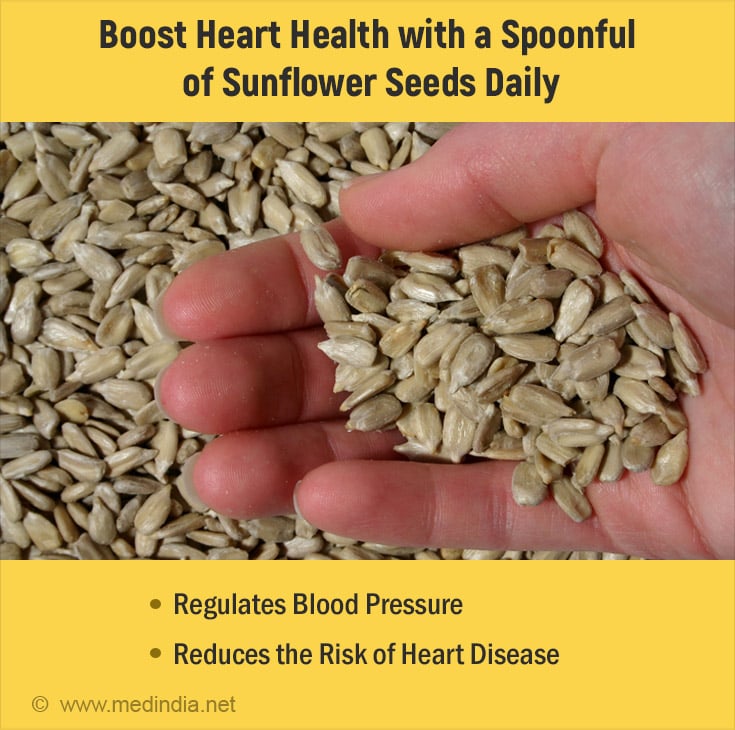- Nutritional Characteristics Assessment of Sunflower Seeds, Oil and Cake. Perspective of Using Sunflower Oilcakes as a Functional Ingredient - (https://pubmed.ncbi.nlm.nih.gov/34834848/)
- Oilseed crop sunflower (Helianthus annuus) as a source of food: Nutritional and health benefits - (https://www.ncbi.nlm.nih.gov/pmc/articles/PMC7500752/)
- Deoiled sunflower seeds ameliorate depression by promoting the production of monoamine neurotransmitters and inhibiting oxidative stress - (https://pubs.rsc.org/en/content/articlelanding/2021/fo/d0fo01978j)
About
Sunflower seeds are more than just a tasty snack—they’re a powerhouse of nutrients with numerous health benefits. Packed with essential vitamins, minerals, and healthy fats, these tiny seeds can contribute significantly to your overall health. They are rich in vitamin E, B vitamins, magnesium, selenium, and iron, which support various bodily functions, from boosting immunity to promoting heart health. With their crunchy texture and nutty flavor, sunflower seeds can be a delightful addition to your meals and snacks.
Incorporating a spoonful of these nutrient-dense seeds into your daily diet can make a big difference in your overall well-being. Whether you're looking to enhance your skin health, improve digestion, or boost your energy levels, sunflower seeds offer a simple and effective solution. Their antioxidant properties help protect against chronic diseases, while their high fiber content supports healthy digestion. Here are ten compelling reasons to eat sunflower seeds every day.
Did You Know?
Sunflower seeds were first cultivated by Native Americans over 5,000 years ago for food, oil, and medicinal purposes! #sunflowerseeds #medindia
Top 10 Health Benefits of Sunflower Seeds
Rich in Nutrients
Sunflower seeds are packed with essential nutrients. They are an excellent source of vitamin E, B vitamins, magnesium, selenium, and iron. Vitamin E is a potent antioxidant(1✔ ✔Trusted Source
Nutritional Characteristics Assessment of Sunflower Seeds, Oil and Cake. Perspective of Using Sunflower Oilcakes as a Functional Ingredient
Go to source), while B vitamins play a crucial role in energy production and brain function. Magnesium supports muscle and nerve function, selenium boosts immunity, and iron is vital for oxygen transport in the blood.
Heart Health
Sunflower seeds are rich in healthy fats, particularly polyunsaturated and monounsaturated fats, which are beneficial for heart health. They contain phytosterols, compounds that help
Oilseed crop sunflower (Helianthus annuus) as a source of food: Nutritional and health benefits
Go to source).
Antioxidant Properties
The high content of vitamin E in sunflower seeds provides significant antioxidant benefits. Antioxidants help neutralize free radicals in the body, which can damage cells and contribute to chronic diseases. By reducing oxidative stress, sunflower seeds help protect against conditions such as cancer and heart disease.
Supports Immune System
Sunflower seeds are a great source of zinc and selenium, both of which are essential for a healthy immune system. Zinc helps maintain immune function, while selenium acts as an antioxidant that helps reduce inflammation and enhances immunity.
Improves Skin Health
Vitamin E, found abundantly in sunflower seeds, is known for its skin benefits. It helps protect skin cells from damage, supports skin regeneration, and keeps the skin hydrated and smooth. Regular consumption of sunflower seeds can lead to healthier, more radiant skin.
Promotes Healthy Digestion
Sunflower seeds are a good source of dietary fiber essential for healthy digestion. Fiber helps regulate bowel movements, prevent constipation, and maintain a healthy gut. Including fiber-rich foods like sunflower seeds in your diet can support digestive health and improve nutrient absorption.
Regulates Blood Sugar Levels
The nutrients in sunflower seeds, such as magnesium, help regulate blood sugar levels. Magnesium plays a role in glucose metabolism and insulin sensitivity, making sunflower seeds a healthy snack for people with diabetes or those looking to prevent blood sugar spikes.
Supports Bone Health
Sunflower seeds contain several minerals important for bone health, including magnesium, phosphorus, and copper. These minerals help maintain bone density and strength, reducing the risk of osteoporosis and other bone-related conditions.
Enhances Mood
Sunflower seeds are rich in tryptophan, an amino acid that helps produce serotonin, a neurotransmitter that regulates mood. Eating sunflower seeds can help enhance your mood and may even alleviate symptoms of depression and anxiety(3✔ ✔Trusted Source
Deoiled sunflower seeds ameliorate depression by promoting the production of monoamine neurotransmitters and inhibiting oxidative stress
Go to source).
Boosts Energy
The combination of protein, healthy fats, and fiber in sunflower seeds provides a steady source of energy. These nutrients help stabilize blood sugar levels, preventing energy crashes and keeping you feeling energized throughout the day.










